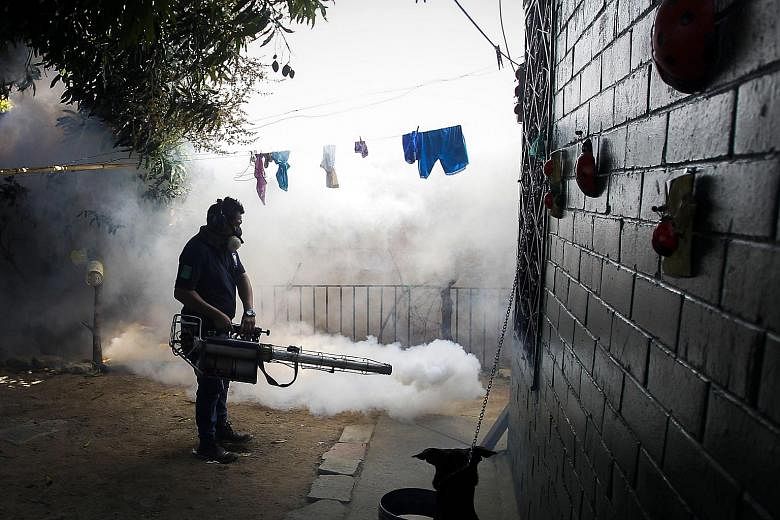SAN SALVADOR • Health officials in many nations in Latin America are urging women not to get pregnant in an effort to halt a surge of birth defects suspected to stem from the rapid spread of the mosquito-borne Zika virus.
Originating in East Africa, Zika landed in Latin America last year and has spread across virtually the whole region via Aedes aegypti mosquitoes, according to the Panamerican Health Organisation. Many cases have also been reported in the Caribbean.
So far, El Salvador appears to have taken the most dramatic step to combat the virus, urging women not to get pregnant until 2018, although the recommendation issued last week is not official policy.
To combat its spread, other Latin American countries such as Colombia and Ecuador, as well as Jamaica in the Caribbean, have recommended delaying pregnancies, though not for an entire two years.
The rest of Latin America has responded with different tactics, ranging from widespread fumigation efforts to directing citizens not to be bitten by the Aedes mosquito, which is known to carry yellow, chikungunya and dengue fevers. In particular, women were urged to prevent mosquito bites, including by wearing long sleeves and pants, and applying insect repellent.
The hardest-hit nation in the region has been Brazil. The World Health Organisation (WHO) last week noted a surge in cases of microcephaly in Brazil. Microcephaly is a rare, incurable condition in which an infant's head is abnormally small.

WHO spokesman Christian Lindmeier said last Friday there were 3,893 suspected microcephaly cases in Brazil, which included 49 deaths. Before last year, there were about 160 cases of microcephaly in Brazil on average.
"The link between the Zika and the microcephaly... is still being investigated," Mr Lindmeier said, but acknowledged that Zika "seems the strongest candidate".
There is no overall figure for the number of cases detected globally, but it has previously been detected in Africa, South-east Asia and the Pacific Islands.
Fears over the outbreak have pushed up the price of mosquito repellent in Brazil, where Health Minister Marcelo Castro said last Friday that a "war" against the Aedes aegypti type was failing.
"For nearly 30 years, the mosquito has been transmitting these illnesses to our population and since then we've been fighting, but we are losing," he was quoted as saying by Brazil's G1 news site.
The health authorities say no vaccine is currently available for the virus, and only the symptoms can be treated.
For most people, the effects of the Zika virus are mild. Victims are sometimes unaware that they have contracted the virus and hospital treatment is rarely needed.
Symptoms include a skin rash, fever, muscle and joint pain, lasting up to seven days.
Concerns about the virus led US health authorities to expand their travel warning last Friday for pregnant women to avoid 22 places in Latin America and the Caribbean. The latest advisory added places including Barbados, Bolivia, Ecuador, Guyana, Cape Verde and Samoa to an alert issued by the United States Centres for Disease Control and Prevention previously that had named Brazil, Colombia and El Salvador, among others.
Pregnant women and women considering becoming pregnant have been urged by the agency to postpone visits to those countries.
The New York State Department of Health said last Friday that three people in New York, who had travelled to areas outside the US, had also tested positive for the virus.
NEW YORK TIMES, AGENCE FRANCE-PRESSE

